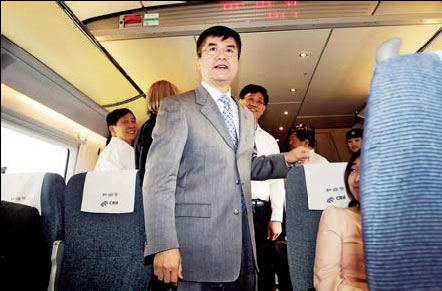Trip to Reinforce ties Across the ocean
Updated: 2012-02-15 08:05
By Zhang Yuwei (China Daily)
|
||||||||
|
Gary Locke, US ambassador to China and former commerce secretary, rides the bullet train on a trip from Beijing to Tianjin in 2010. [Jason Lee / Reuters] |
China is in a perfect position to assist US in rebuilding aging infrastructure
NEW YORK - With Chinese investment in the United States increasing, Chinese companies' assistance in rebuilding the crumbling US infrastructure system comes at an opportune time.
In the 2013 budget US President Barack Obama sent to Congress on Monday, he proposed more than $350 billion in short-term measures for job growth including an investment of $50 billion from the surface transportation reauthorization bill for roads, rails and runways to create new jobs in the short term.
Obama has on many occasions stressed the need to rebuild US' aging infrastructure.
"Building a world-class transportation system is part of what made us an economic superpower," Obama said in a speech last year on job creation. He added that the US cannot "sit back and watch China build newer airports and faster railroads".
China, on the other hand, has focused on rapidly building its infrastructure in the past few years. Many say this is something it can definitely teach the US.
Francis Fukuyama, a fellow at the Freeman Spogli Institute for International Studies at Stanford University, argued in a Financial Times piece that "the most important strength of the Chinese political system is its ability to make large, complex decisions quickly, and to make them relatively well, at least in economic policy."
This, he wrote, is most evident in the area of infrastructure.
"Americans pride themselves on constitutional checks and balances, based on a political culture that distrusts centralized government," he wrote.
China seems perfectly placed to help because it can provide expertise and, most importantly, capital - what the US needs most in various infrastructure projects.
In Beijing, four new subway lines will start operating later this year, making the city's total length of the subway lines more than 450 kilometers. That number will allow Beijing to reach the international standard of having a "real subway network".
In New York's tri-state metropolitan area just two years ago, New Jersey canceled a project that would have built a new tunnel between New Jersey and Manhattan in order to close short-term budget gaps. Commuters currently take trains that share a tunnel under the Hudson River with Amtrak, the national rail carrier, running on two tracks built in 1910.
Last year, Obama proposed $80 billion for infrastructure, $30 billion of which was for repairing and renovating schools and $50 billion for other infrastructure projects.
However, that amount pales in comparison to what China has committed to its infrastructure building.
China's Ministry of Railways said that it will spend about $300 billion in building transportation systems through 2020, while the US Federal Railroad Administration said it would commit about $8 billion in similar projects in 2012.
Yuan Ning, president of China Construction America, a wholly owned subsidiary of China State Construction Engineering Corporation, said the perfect way for China and the US to collaborate is through public-private partnership for infrastructure projects.
PPP is a government service or private business venture that is funded and operated through a partnership between the government and one or more private sector companies. Yuan said Chinese companies working through PPP with the US government and private sectors is a "win-win solution".
Robert Hormats, US under secretary of state for economic, energy and agricultural affairs, agrees that PPP is a good way to work with Chinese companies on infrastructure projects.
"Chinese investment can be really helpful. We would love to have more of that and we will be pursuing that dialogue with the Chinese," Hormats told China Daily after a business event in New York.
Chinese companies not only see the opportunity but also have shown a commitment to be a part of this development.
China State Construction Engineering Corporation recently said it will invest $2 billion in the next few years in the US market for PPP infrastructure projects, mergers and acquisitions and residential projects.
Joe Catapano, a project manager with China Construction America, said the expertise and capital Chinese companies can provide are important.
"The key issue is money. It doesn't seem the United States government is willing to spend money (on building infrastructure)," said Catapano, who has 12 years of engineering experience in New York and California.
"High-speed rail is definitely something we can learn from China. We don't have any of that in the US, anywhere," he added.
China Daily

 Relief reaches isolated village
Relief reaches isolated village
 Rainfall poses new threats to quake-hit region
Rainfall poses new threats to quake-hit region
 Funerals begin for Boston bombing victims
Funerals begin for Boston bombing victims
 Quake takeaway from China's Air Force
Quake takeaway from China's Air Force
 Obama celebrates young inventors at science fair
Obama celebrates young inventors at science fair
 Earth Day marked around the world
Earth Day marked around the world
 Volunteer team helping students find sense of normalcy
Volunteer team helping students find sense of normalcy
 Ethnic groups quick to join rescue efforts
Ethnic groups quick to join rescue efforts
Most Viewed
Editor's Picks

|

|

|

|

|

|
Today's Top News
Health new priority for quake zone
Xi meets US top military officer
Japan's boats driven out of Diaoyu
China mulls online shopping legislation
Bird flu death toll rises to 22
Putin appoints new ambassador to China
Japanese ships blocked from Diaoyu Islands
Inspired by Guan, more Chinese pick up golf
US Weekly

|

|







